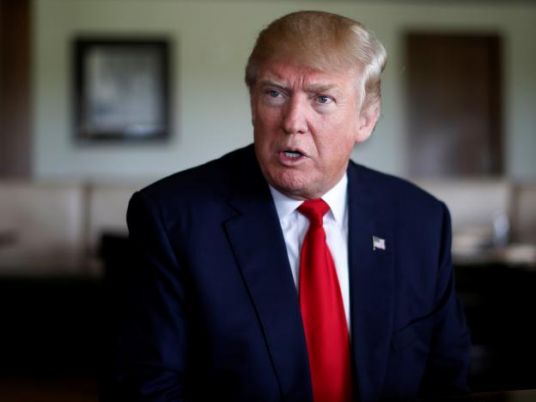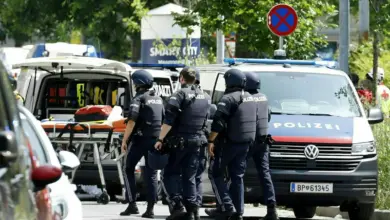
A crisis over the relationship between President Donald Trump's aides and Russia deepened on Wednesday as a growing number of Trump's fellow Republicans demanded expanded congressional inquiries into the matter.
Trump sought to focus attention on what he called criminal intelligence leaks about his ousted national security adviser, Michael Flynn.
Trump forced Flynn out on Monday after disclosures he had discussed US sanctions on Russia with the Russian ambassador to the United States before Trump took office, and that he later misled Vice President Mike Pence about the conversations.
The drama of Flynn's departure was the latest in a series of White House missteps and controversies since the Republican president was sworn in on January 20.
At a news conference with Israeli Prime Minister Benjamin Netanyahu on Wednesday, Trump said Flynn, a retired US Army lieutenant general, was a "wonderful man" who had been mistreated by the news media.
But Republican Trump critics including Senators John McCain and Lindsey Graham voiced fresh consternation. Adding to the pressure were comments by Senate Foreign Relations Committee Chairman Bob Corker, who has been a Trump supporter.
Corker said the Russia issue was threatening Trump's agenda on foreign affairs and domestic matters like healthcare and tax policy. He questioned whether the White House was able to stabilize itself and said Flynn should testify before Congress.
"Let's get everything out as quickly as possible on this Russia issue," Corker told MSNBC's "Morning Joe" program. "Maybe there's a problem that obviously goes much deeper than what we now suspect."
Democrats, doubting Trump's Justice Department or the Republican-led Congress will pursue the matter vigorously, have demanded an independent investigation of possible illegal communications between Flynn and the Russian government and any efforts by Flynn or other White House officials to conceal wrongdoing.
CALLS FOR RECUSAL
The most powerful Democrat in the Senate, Chuck Schumer, said Attorney General Jeff Sessions, a close ally of Trump, must recuse himself from any investigation.
The Republican and Democratic leaders of the US Senate Judiciary Committee asked Sessions and FBI Director James Comey on Wednesday to send the committee documents and provide a briefing on Flynn's resignation.
Citing reports that both the Federal Bureau of Investigation and Justice Department were involved in events leading to Flynn's departure, Senators Chuck Grassley and Dianne Feinstein said they raised "substantial questions" about Flynn's discussion with Russian officials.
Graham called for a broader bipartisan congressional investigation to be conducted by a newly formed special committee rather than existing committees, if it turns out Trump's presidential campaign communicated with the Russians.
But the top Republicans in the Senate and House of Representatives have insisted the matter be investigated by existing Republican-led committees.
The Senate and House Intelligence Committees and a subcommittee of the Senate Judiciary committee have announced they launched investigations into alleged Russian efforts to influence the election through computer hacking.
US intelligence agencies previously concluded that Russia hacked and leaked Democratic emails during the presidential campaign as part of efforts to tilt the vote in the November 8 election in Trump's favor.
Congressional inquiries into alleged Russian interference in the U.S. elections are gaining momentum as Capitol Hill investigators press intelligence and law enforcement agencies for access to classified documents.
The FBI and several US intelligence agencies are investigating Russian espionage operations in the United States. They are also looking at contacts in Russia between Russian intelligence officers or others with ties to President Vladimir Putin's government and people connected to Trump or his campaign.
The FBI recently questioned Flynn about his telephone contacts with the Russian ambassador in Washington. People familiar with the agency's multiple probes said there was no evidence so far of pre-election collusion between Russians and Trump's campaign, or any evidence of criminal activity by Flynn or anyone else connected to Trump.
Some experts expressed concern the White House could curtail or divert probes into Flynn and Russian involvement in the election unless Congress becomes more aggressive by holding hearings and appointing an independent commission or special prosecutor into whether Trump's team violated federal laws in their contacts with Russia.
Intelligence agencies now overseen by Trump may not be ideally suited to the job, they added.
"It's not, at the end of the day, the job of the intelligence community to regulate the White House – and it shouldn't be," said Stephen Vladeck, a University of Texas law professor who focuses on constitutional law and national security.
'VERY UN-AMERICAN'
In Twitter posts on Wednesday, Trump called the reported Russian connection with his campaign team nonsense and said the leaks were the "real scandal."
From early on in his White House bid, Trump said he would like improved relations with Putin, a stance criticized by Democrats and those Republicans concerned about Washington softening its stance after Russia's annexation of Crimea from Ukraine and aggression in Syria.
Only a few Republican lawmakers have supported even the idea of extending any investigation to cover actions by Trump's team in the weeks after the election, when Flynn made his calls.
Some Republicans, including House Intelligence Committee Chairman Devin Nunes, are calling for investigations into leaks to the news media of conversations between Flynn and Russia's ambassador in Washington.
The Trump administration has offered Flynn's former job to US Navy Vice Admiral Robert Harward, said two US officials familiar with the matter. It was not immediately clear if Harward, a former deputy commander of US Central Command, had accepted the offer, according to sources.
(Reporting by By Steve Holland and Patricia Zengerle in Washington; Additional reporting by Rick Cowan, Mohammad Zargham, Susan Cornwell, Susan Heavey, Julia Edwards Ainsley, Doina Chiacu, Julia Harte and Mark Hosenball; Writing by Will Dunham and Lisa Lambert; Editing by Frances Kerry and Peter Cooney)



